SIM Sokcheng
Senior Research Fellow and Centre Director


This study evaluates the economic and nutritional impacts of integrating school-grown gardens into Cambodia’s school meals program during the 2022-2023 academic year, using a mixed-methods approach. State-run schools were the most cost-efficient, with an annual cost of USD 38.90 per student, compared to USD 55.24 in WFP-run schools due to higher in...

This policy brief evaluates the cost-effectiveness, nutritional adequacy, and sustainability of Cambodia's three School Feeding Program (SFP) modalities: state-run, WFP-run, and school-gardening programs. Data from the 2022-2023 school year revealed disparities in implementation. The state-run model was the most cost-efficient, spending USD 38.9 pe...

The “Cost-Nutrition Assessment Guideline for School Feeding Program in Cambodia” utilizes a modified SEEM (Scope, Economic Components, Evaluation, and Measurement) framework to evaluate the cost-effectiveness, sustainability, and nutritional impact of decentralized school feeding programs. The framework assesses program boundaries, resource allocat...

This study investigates the profitability and technical efficiency of chilli farming in Cambodia using data from 542 households and 719 plots across six provinces. Employing a revenue-cost framework and stochastic frontier analysis, the research evaluates yields, input costs, and production efficiency. Bird’s eye and lady’s finger chillies are the...
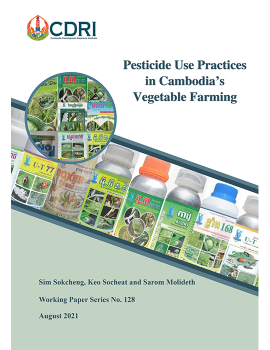
Pesticides are agricultural technologies that farmers use to control pests and weeds and remain an important modern input for crop production including vegetable farming. There are many types of pesticides, such as insecticides, fungicides, rodenticides and herbicides, that target different threats to crops. While the potential production benefits...
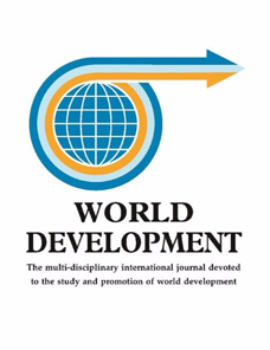
Growing rural-to-urban and international migration flows have sparked concerns about the investments in the education of the children left behind in Cambodia. We draw on a panel household-level survey conducted in rural villages in 2014 and 2017 to analyse the relationship between parental migration and children’s schooling. The analysis shows that...
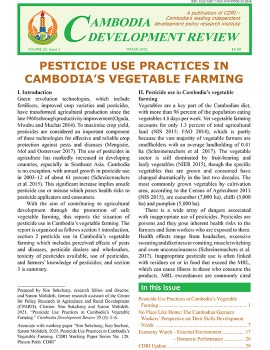
Pesticides are agricultural technologies that farmers use to control pests and weeds and remain an important modern input for crop production including vegetable farming. There are many types of pesticides, such as insecticides, fungicides, rodenticides and herbicides, that target different threats to crops. While the potential production benefits...
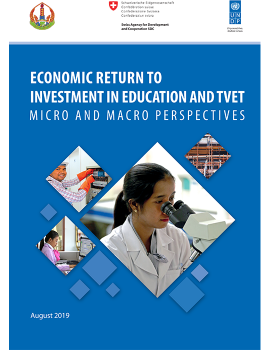
This study is a part of the UN Joint Programme through which the UNDP seeks to examine the relationship between the economic/monetary returns of investments in education and technical vocational education and training (TVET) at individual, household and national levels. The overall objectives of the study are (1) to estimate the rate of return at t...

This report reviews a project funded under the research program called “Scale up of Homestead Food Production for Improved Nutrition in Cambodia”, also known as “Family Farms for the Future (FF4F)”. The project tries to capture FF4F’s immediate and potential contribution to food security. FF4F aims to help three main groups: large-scale producers o...

There are many studies about rice production in Cambodia, but none focus on the geographical location of rice production, particularly in the south-eastern provinces of Prey Veng, Takeo and Svay Rieng. Farmers in these areas produce mainly low-value rice (IR504) most of which is exported as wet paddy to Vietnam. The Vietnamese government recently d...

Climate change-driven extreme weather events such as droughts and heatwaves which pose a serious threat to rural livelihoods, food security, and poverty reduction in Cambodia. As one of the most climate-vulnerable countries in Southeast Asia, Cambodia’s rural population, heavily dependent on agriculture, faces increasing risks of crop failure, inco...
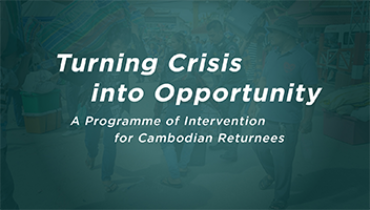
This project, jointly developed by CDRI and the Economic Research Institute for ASEAN and East Asia (ERIA), provides a comprehensive policy and programme framework to support the reintegration of approximately 910,000 Cambodian migrant workers who returned from Thailand in 2025. The initiative outlines a coordinated response that combines emerg...

Effective public service delivery is a cornerstone of socio-economic development, ensuring services reach citizens efficiently and equitably. Over the past decade, Cambodia has made notable progress in improving its Public Financial Management system. The Public Financial Management Reform Program (PFMRP) has played a crucial role in enhancing budg...

Effective public service delivery is a cornerstone of socio-economic development, ensuring services reach citizens efficiently and equitably. Over the past decade, Cambodia has made notable progress in improving its Public Financial Management system. The Public Financial Management Reform Program (PFMRP) has played a crucial role in enhancing budg...
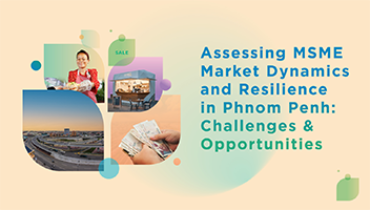
Micro, small, and medium enterprises (MSMEs) form the backbone of Phnom Penh’s urban economy, yet they are increasingly pressured by economic slowdown, and digital disruption. High business turnover reflects survival-driven entrepreneurship, with most firms remaining informal, micro-scale, and concentrated in low-productivity sectors. Given the...

The AGROW project in Cambodia, led by Veterinarians Without Borders (VWB) with partners AVSF Cambodia and ADA, focuses on training women farmers in sustainable agriculture and livestock production to enhance financial and nutritional outcomes. Running from 2022 to December 15, 2024, the program targets climate-smart practices in cricket, chicken, c...

This two-year project builds upon previous PRCI initiatives in Southeast Asia, addressing the urgent need for advanced economic policy analysis skills in the Mekong subregion's agri-food system, which includes Thailand, Laos, Cambodia, and Vietnam. The project aims to bridge the expertise gap identified by regional partners and boost research capac...

Feed the Future Innovation Lab for Food Security Policy Research, Capacity, and Influence (PRCI) is a project funded by USAID to enhance the ability of local policy research organizations to conduct high-quality food security policy research and influence food security policy more effectively while becoming increasingly self-reliant. Since 20...

The Cambodia Nutrition Project (CNP) is a seven-year, US$62.5 million project to anchor the RGC’s enhanced and coordinated response to accelerate the human capital formation focusing on maternal and child health and nutrition (MCHN) in the early years. The CNP addresses Cambodia’s persistent high levels of stunting and aims to close equity gap...

Assessment Studies on The Economic Costs of an Integrated School Gardening in School Feeding Program
Recognize the important of improving the nutrition and education of children, Cambodia government is implementing school feeding program collaboratively with local and international NGOs. The implementation of this program will improve food security, education, health and nutrition, local economy and agriculture, partnership and coordination across...
